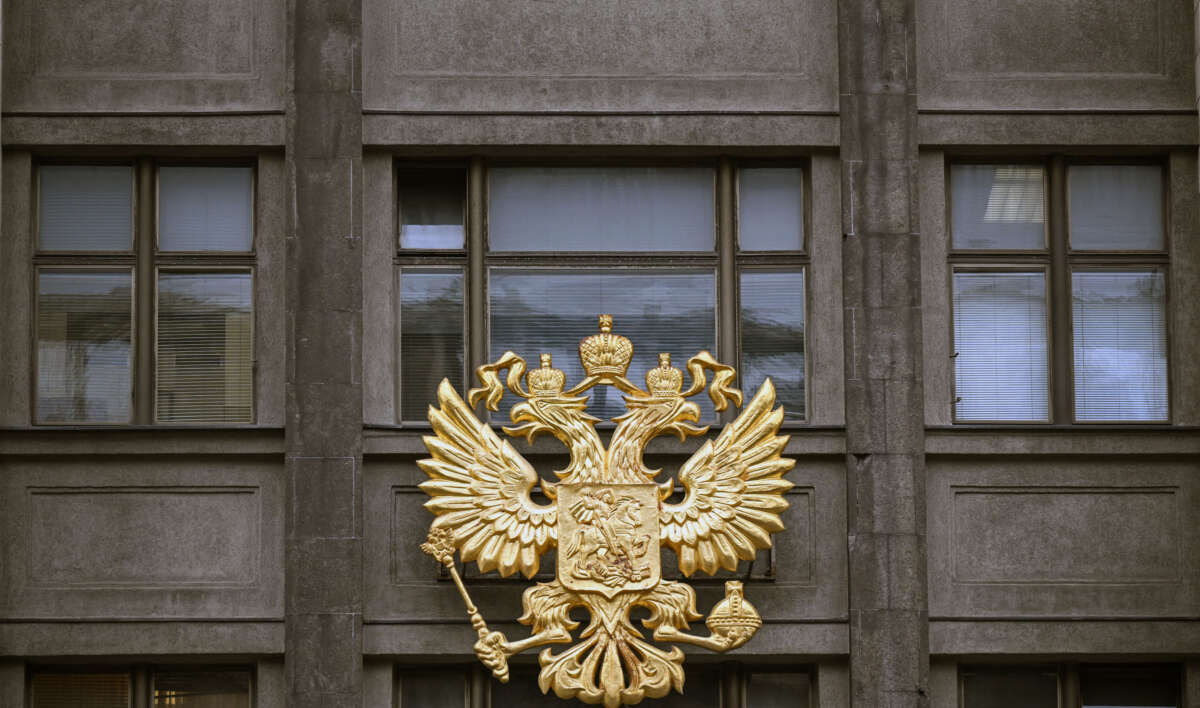Truthout is an indispensable resource for activists, movement leaders and workers everywhere. Please make this work possible with a quick donation.
Russian lawmakers have passed an even more restrictive version of an anti-LGBTQ bill that would outlaw gender-affirming care and changing one’s gender in legal documents and public records, adding clauses that would annul marriages that include a person who has “changed gender” and bar transgender people from fostering or adopting children.
Yulia Alyoshina, Russia’s first transgender politician, has warned that this attack on the country’s transgender community will have severe consequences. “This bill is not just discriminatory, it is a real genocide of transgender people,” Alyoshina told CNN.
Though the bill still needs to be passed by the Russian senate, LGBTQ activists are concerned that the upper chamber will rubber-stamp the legislation, which is supported by Russian President Vladimir Putin.
“This is in its purest form a fascist law,” Elle Solomina, a Russian transgender woman, told Reuters. “I have not found any explanation for it, except that in a totalitarian system, the population must live in fear.”
The fear that this law will pass has spurred a number of transgender Russians to start gender-affirming care in case their ability to do so is stripped away in the future.
“The way how these people see their future is collapsing. We are getting a lot of suicidal messages,” Yan Dvorkin, the head of Center-T, a group that helps transgender and non-binary people in Russia, told The Moscow Times.
In 2022, Russia ranked 46th out of 49 European countries by Rainbow Europe’s annual LGBT rights rankings. Since 2013, Russia has enacted multiple anti-LGBTQ laws that restrict the promotion of so-called “LGBT propaganda.” These laws have effectively outlawed the public life of LGBTQ Russians, as well as books, films and online spaces that “promote” homosexuality. Because of these laws, Russian LGBTQ activists have faced state repression and arrests.
In May, Dvorkin was found guilty of violating Russia’s “LGBT propaganda law” and fined. “It is inhumane that the state makes it legal to discriminate against an entire group of the population, which is about 14 million citizens of Russia,” Dvorkin wrote in his appeal.“I never imposed on others what they should be and what they should do. I deeply respect the freedom of every person to be themselves.”
The “LGBT propaganda” law has also led to online support groups for LGBTQ children being targeted, journalists being fined, LGBTQ websites being banned, and non-Russian citizens being deported.
In another concerning move, Vladimir Putin recently instructed Russia’s Health Ministry to study the “social behavior” of LGBT People, raising alarms in Russia’s LGBTQ community that Russian authorities could start conducting mass “conversion therapy” on its LGBTQ citizens in the near future. The UN has called for a global ban of the practice, stating that conversion therapy causes suffering and long-term psychological harm, and can amount to torture.
“We knew that they didn’t like us here, but to go absolutely against human rights, against the existing laws even,” Maxim, a 29-year-old transgender Russian activist, told Associated Press.
Human Rights Watch has stated that Russia’s crackdown on LGBTQ lives is a way to distract from the country’s military losses in the Ukraine and “to consolidate conservative support at home and position Russia as the defender of ‘traditional values,’ in opposition to ‘the west.’”
Many experts have pointed out the ways in which internal attacks on Russians’ civil freedoms and the war in Ukraine are interconnected. For example, Russia has recently targeted LGBTQ activists and nonprofits by labeling them as “foreign agents.” A 2022 expansion of Russia’s foreign agent law allows almost any person or entity, regardless of nationality, to be labeled as a “foreign agent” if authorities claim that the individual is under “foreign influence.”
These attacks on LGBTQ life in the country have forced LGBTQ journalists, human rights lawyers and activists to flee Russia. LGBTQ journalist Karen Shainyan, who was labeled a “foreign agent” by the government, felt like it was unsafe to stay in the country and fled to Germany. “I’m here because it’s not safe to cover queer rights [in Russia] anymore,” he told Openly.
On Thursday, Russia’s security service disclosed that it had arrested a transgender rights activist for “high treason” for financially supporting Ukraine. Treason is punishable by 12 to 20 years imprisonment in the country.
“Amid war fever, Russia’s also ramping up homophobia – the ‘gay propaganda’ ban is stronger and gender transitions are soon to be banned,” Max Seddon, Moscow Bureau Chief at the Financial Times said on Twitter. “This [arrest] is the confluence of the two.”
A terrifying moment. We appeal for your support.
In the last weeks, we have witnessed an authoritarian assault on communities in Minnesota and across the nation.
The need for truthful, grassroots reporting is urgent at this cataclysmic historical moment. Yet, Trump-aligned billionaires and other allies have taken over many legacy media outlets — the culmination of a decades-long campaign to place control of the narrative into the hands of the political right.
We refuse to let Trump’s blatant propaganda machine go unchecked. Untethered to corporate ownership or advertisers, Truthout remains fearless in our reporting and our determination to use journalism as a tool for justice.
But we need your help just to fund our basic expenses. Over 80 percent of Truthout’s funding comes from small individual donations from our community of readers, and over a third of our total budget is supported by recurring monthly donors.
Truthout’s fundraiser ends tonight! We have a goal to add 122 new monthly donors before midnight. Whether you can make a small monthly donation or a larger one-time gift, Truthout only works with your support.
